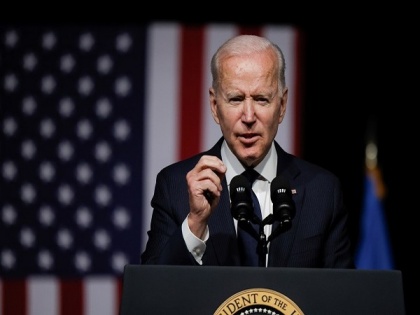US military withdrawal from Afghanistan should not mean diplomatic disengagement: expert
By ANI | Published: November 7, 2021 11:09 PM2021-11-07T23:09:23+5:302021-11-07T23:20:03+5:30
With the humanitarian situation continuing to worsen in Afghanistan, several experts and UN agencies have called on the international community to step up its efforts to curtail the crisis.

US military withdrawal from Afghanistan should not mean diplomatic disengagement: expert
With the humanitarian situation continuing to worsen in Afghanistan, several experts and UN agencies have called on the international community to step up its efforts to curtail the crisis.
In an opinion piece for the Virginia-based Politico, Saad Mohseni, chairman and CEO of Afghanistan's largest media group Moby Group said that US President Joe Biden may wish to forget about Afghanistan, but there's never been a more urgent need for the US to stay involved.
Mohseni argued that a military withdrawal should not mean diplomatic disengagement regardless of political consequence for the White House. "The crises that are consuming Afghanistan threaten to exacerbate the very problems Washington intervened to deal with in the first place. Biden does not have to formally recognize the Taliban, but neither can he wish away their control of the country," he said.
"Working closely with international partners, the US should ensure aid gets to those who need it most -- even if that means dealing with the people they battled for 20 years."
Warning that Afghanistan's problems never stay within its landlocked borders, Mohseni said that the desperate economic and humanitarian situation could reignite conflict within the country.
"Colin Kahl, the US undersecretary of Defense, warned this week that the Islamic State in Khorasan Province and al Qaeda could be able to launch attacks on the West in anywhere from six months to two years," he said.
The media tycoon even said that Europe could soon find itself contending with a fresh refugee crisis and the flow of narcotics from the world's largest source of heroin.
"Already, large numbers of Afghans are attempting to cross any border that is open to them, driven there by fear and hunger. They may be forced to make the journey northward, along the same route used by drug smugglers, passing through Iran and Turkey."
This warning comes as nearly 55 per cent of the Afghan population are estimated to be in a crisis or experiencing emergency levels of food insecurity between now and March of next year.
Speaking to journalists in New York, the Spokesperson for the UN Secretary-General pointed to reports that isolated clashes and violence affecting civilians and resulting in casualties continued countrywide this week.
The UN Office for the Coordination of Humanitarian Affairs (OCHA), in its situation report, showed concern about "conditional humanitarianism" or attempts to "leverage" humanitarian assistance for political purposes.
The Afghanistan Flash Appeal, which targets 11 million people with aid through the end of the year, seeks USD 606 million and is currently 54 per cent funded.
"Humanitarians remain concerned about 'conditional humanitarianism' or attempts to 'leverage' humanitarian assistance for political purposes. Further, donors are urged to ensure transactions and other activities required for humanitarian operations are excluded from the scope of sanctions regimes to allow humanitarian activities to continue without impediment," the OCHA report said.
( With inputs from ANI )
Disclaimer: This post has been auto-published from an agency feed without any modifications to the text and has not been reviewed by an editor
Open in app